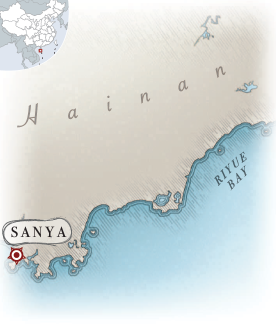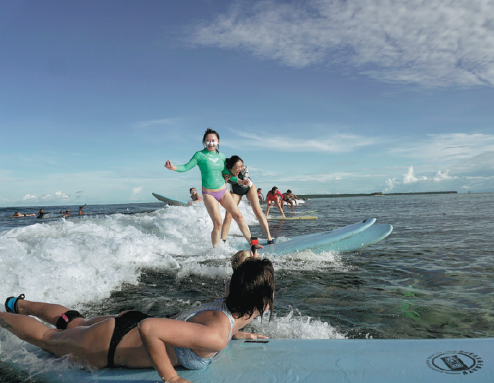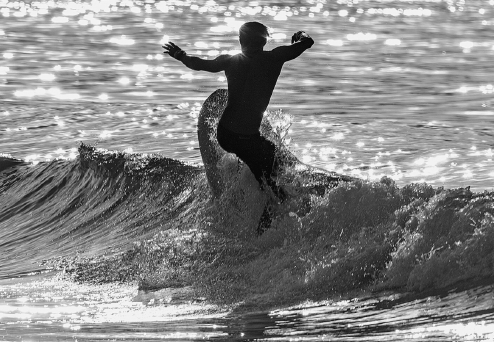SUN, FUN, SURF AND WHAT NEPTUNE TEACHES
You don't have to head to an exotic foreign location to catch a big wave or two

Every day tanned gods and goddesses-the male of the species bronzed, athletic and sporting swimming trunks, the female bronzed, athletic and wearing a bikini-emerge from wooden clubhouses carrying colorful surfboards. From there they saunter across a palm tree-lined paved road, pass by a gigantic blue bowl that acts as a skating training ground on which surfers can improve their balance, and cross a stone bridge before reaching their playground: the golden sands and clean, warm water of Riyue Bay.
We are about 100 kilometers from the tourist resort of Sanya in Hainan province, in an outlying and relatively little known village on the east coast of the tropical island, a utopia for Chinese surfers, and not only them.
The swells and occasional barrel waves are powerful enough to attract surfers from around the world all year round, and the high respect in which the bay is held is reflected in its having been chosen for championship events run by organizations such as the World Surf League and the International Surfing Association championship in recent years.
That in turn is gradually adding to Riyue Bay's mystique as the birthplace of Chinese surfing and producing everything attached to that, including a laid-back culture whose background music is the crashing of ocean waves and the theme of whose chatter seems to be the surf, tidal movements and "Did you catch any big ones today?"
Huang Wen, 34, a Riyue Bay native, is part of the country's embryonic surfing industry and a witness to how his hometown has caught the wave of a sport that itself came on a wave all the way from Polynesia.
Both Huang's father and grandfather made a living from fishing, and Huang began helping the family fish or collect conch shells on the beach from a very young age, at the same time building up a robust constitution and outstanding swimming stamina.
He was 13 when he first saw someone who was not Chinese riding the waves on a board in the bay, bouncing about and playing with the hydrodynamic forces, but it would not be until nine years later that he decided to give it a go himself.
"That day I came across several Japanese surfers on the secluded beach, and one asked me to come over and have a try."
To their surprise, after Huang paddled into the waves he managed to pop up on the board at his first try with his knees bent, arms extended and torso leaning forward.
"Keeping balance on the board is a lot like standing on a small fishing boat, so it was not as difficult as I had imagined."
The Japanese, suitably impressed, gave Huang a board as a gift when they left the bay. Over the 12 intervening years he has spent hundreds of hours honing his surfing techniques, turning from a novice into a seasoned expert.
In the early days Huang's mother ran a seaside seafood restaurant that was popular among visitors who traveled to the place to surf.
"Other local restaurants did not welcome these people because they usually wore sopping wet suits covered with sand," Huang says. "So naturally after we had been surfing I would take them to my mother's restaurant."
He thus forged good relationships with these non-local surfers, and when they left they would often give him their wet suits and surfboards as a token of thanks for his help.
In 2008 he put surfing gear on display in the restaurant and opened a surfing rental shop. Three years later he launched the first surf club in the area but it drew little interest.
"The sport was then not familiar enough to Chinese to try it out," Huang says. "And the village was a virtually unknown destination for tourists."
Eventually he decided to put aside spear fishing and concentrate more on competitive professional surfing. These competitions have taken him to many places including Shenzhen and Shantou in Guangdong province, Bali in Indonesia, Jeju in South Korea and Tokyo Bay in Japan. One of his highlights was winning the Jeju Open event in June 2017.
"I used to just be a fisherman, but my surfboard has taken me to a bigger stage and I have made friends with surfing lovers from all over the world. I hope that as Chinese surfers take part in international events and start to win them it will promote the sport in the country and result in government support, including starting programs and building infrastructure that will help turn Riyue Bay into a well-developed surfing resort."
In October he opened a new surf club on the beach of Riyue Bay that offers board rental, surfing training and food. In the first four weeks after it opened it had attracted more than 100 customers, he says, much more compared with the number of the customers Huang's first club had over a similar period in 2011.
Surfing will make its debut as an Olympic sport in the Games in Tokyo next year, and that exposure is likely to result in many more Chinese wanting to try the sport.
By the end of last year surfing spots in Hainan, Shenzhen, Qingdao in Shandong province and Fuzhou in Fujian province had two dozen surf clubs, with more than 1,000 surfers living near them as members.
Zhang Xiaoxiao, 24, chose to move to Hainan, mainly because of her fascination with surfing, after she graduated from Huazhong University of Science and Technology in Wuhan, Hubei province, in 2017.
During the summer holidays in 2015 Zhang, who studied architecture, visited Riyue Bay for the first time and volunteered to draw graffiti for a surf club.
"I found the tranquil place was very different to the hustle and bustle of well-known coastal resorts I had been to in Xiamen and Qingdao. When you look out over the ocean, anything that's bothering you simply disappears."
During her one-month stay in the surf club she practiced paddling on a board and the procedure by which the surfer manages to stand up.
At first she could barely get a thrill out of trying to ride because she was slender and lacked the strength to control the board, she says. Nevertheless, learning to surf was enjoyable because its relaxing nature helped put her in contact with nature.
"Doing all of this I realized how important it is to keep fit and remain a high degree of physical vigor," says Zhang, who later began to do regular physical workouts and tried other sports such as free diving, climbing and skateboarding, and yoga.
"Surfing opened a door for me to the overwhelming happiness of challenging myself."
She thus built a well-proportioned body and after graduating became a freelance model, allowing her to travel to seaside destinations frequently and enjoy the waves.
In addition, sporty images and messages on positive attitudes to living that she has posted on Sina Weibo have gained her more than 100,000 followers, encouraging her to continue telling others about what she does, using photos and videos, in the hope that one day she can be an online influencer.
Zhang says surfing has helped her form her own beauty standard and she does not blindly follow the precept that says that for women slim figures and white skin are the ideal.
"I'm so proud of my nice suntan and body shape now."
Guo Shujuan, 33, China's top-class female surfer, is sure that the sport can improve one's personality.
"Regular surfing keeps you fit, lifts your confidence and awakens your spirit of adventure, and that helps people, especially females, to grow."
This year she initiated female surf camps in which women immerse themselves in local surfing culture in countries such as the Philippines and Sri Lanka.
"I could never get bored seeing the smiles plastered across women's faces as a wave propels them forward and think of how the experience will change them physically and mentally."
Guo, the first Chinese surfer to win an international women's long-board surfing competition, says surfers should think not only about how to master the board but also about the life philosophy they can learn from the sport.
Even veteran surfers have to wait in the water for a long time before they find a wave they can ride, she says, and even when a good wave appears the surfer needs to be well placed to be able to paddle out to catch it; otherwise the chance can be lost.
"You have to decide on which technique you will use on the board, depending on the movement of the waves. At this point, too, you have to remain calm and patient before the suitable waves roll toward you."
For her the best time to surf is at dawn.
"I sit on my surfboard alone and watch the glowing sphere slowly rise from below the horizon into the dull morning sky, and the colors of the water change as time passes by. That beautiful scene soothes my mind."
A friend of Guo, Liu Dan, 38, who was also a professional surfer, agrees, adding that surfing enables her to isolate her from others and to talk to her inner self.
She has also found that the sport has got her closer to the sea, wildlife and nature as a whole, reducing her desire for material wealth, she says.
The Hubei native is now living in Houhai village, Sanya, where she runs a vegan restaurant, enjoys a Spartan and eco-friendly lifestyle and regularly organizes litter cleanups of the beach.
Most of those who take up surfing become ardent environmentalists because they are eager to surf in clean water, she says.
"When you ride waves you feel as though you are communicating with the sea, and before you can forge a harmonious relationship with the ocean you need to learn more about it and the animals that live in it."
With that aim in mind she has done scuba diving courses and learned a lot about marine creatures, and from 2015 she worked for a Malaysian film production company that was making ocean-protection-themed videos and having Chinese subtitles added to them.
"It would be great if more Chinese people see these videos and become aware of the importance of protecting the ocean and living a sustainable life," she says.








Today's Top News
- Xi taps China's deep wisdom for global good
- New rules aim for platforms' healthy growth
- Chinese web literature grows overseas
- Postgrad exam trend points to thoughtful approach
- World's highest urban wetland a global model
- How China's initiatives are paving a new path to a better world






























